ASF 011: Grant Fritchey interview
Introduction
Grant Fritchey is a Microsoft SQL Server MVP with over 20 years of experience in IT, including time spent in support and development. He has worked with SQL Server since 6.0, back in 1995. He has developed in Visual Basic, Visual Basic .NET, C# and Java. He is the author of the books SQL Server Execution Plans (Simple-Talk), SQL Server Query Performance Tuning (Apress) and co-author “Expert Performance Indexing”, “SQL Server MVP Deep Dives 2”, “Beginning SQL Server 2012 Administration” and “Pro SQL Server 2012 Practices”.
Since 2009 he has been awarded as a Microsoft SQL Server MVP. In 2014 I was awarded as a Dunn & Bradstreet MVP. In 2011 I received the Tech10 Award in Rhode Island and joined Red Gate Software as a Product Evangelist in January.
Grant volunteers at PASS, currently serving on the PASS Board of Directors as the President.
This talk has taken place during PASS Summit in Seattle, WA, on 3rd November 2017 (Friday).
Do you wanna know why Grant is so-called Scary DBA? How is he sharing his working time between Redgate and PASS and who has given him 6-weeks sabbatical? What is his approach to teaching, speaking and working? What does mean work-life balance for him?
Check this out right now.
Transcript
Kamil Nowinski: This is a podcast for SQL family members from SQL family members. Especially from the well-known SQL family members, like you.
Grant Fritchey: Excellent.
KN: We are going to talk not only about the technical stuff but we will focus more on the community, volunteers, organizations, etc.
GF: Sure, not a problem. Happy to help.
KN: Could you introduce yourself?
GF: My name’s Grant Fritchey. I work for Redgate Software. I’m a Product Evangelist. I’m also a volunteer for PASS organization. Currently I’m serving on the PASS Board. I’m the Executive Vice President for Finance and Governance but starting in January I will be the PASS President.
KN: Congratulations!
GF: Thank you.
KN: Were you announced like an hour ago?
GF: I’ve been announced a little while back but yeah, we’ve made a big deal about it.
KN: Good for you!
GF: Thanks. It’s going to be a bunch of work but we’ll still have fun.
Damian Widera: But I think it is not only good for Grant but also it is good for the whole organization and also for us because Grant is a very energetic person. You are the right person in the right place.
GF: Let’s hope. But I’ve got the real focus on the global goal family. We met over in Poland. And I like coming over there. I will go there as soon as I can. I am really into the whole idea that this is a global organization and global SQL family. The PASS organization needs to do more to support global growth.
KN: Could you explain a little bit in details what are you doing? Let’s start with the PASS.
GF: Currently I’m the Executive Vice President so I do the finances. That means I work with all the other portfolios on their budgeting and figuring out where we’re going to spend the money and how best to spend the money and how much money we’re going to make and where do we take it then from there. The big part of this job is managing the cash – looking at spreadsheets. God knows, I didn’t realize that I was volunteering to look at spreadsheets. As well as that, I also help managing the meetings. We set the agendas and then make sure that we stay on target and get the meetings done – clean and quick – so it’s very little noise and just information so that we can meet the goals and get out the door and stop. I hate meetings. The less we can do, the better. So we manage those. That’s my current work I’ve been doing at PASS. But I’ll become the President and I don’t know what that entails yet, really.
KN: You’ll realize very soon.
GF: Yeah, no kidding.
KN: It sounds like very serious bunch of duties.
GF: You know – it’s work. You put in several hours a week at the minimum. Sometimes more. Like here, at the PASS Summit – it’s been pretty much nonstop. I do a lot of work here. We have meetings with vendors, Microsoft, Microsoft execs. also meetings with each other and the community. We’ve just finished an hour of question-and-answer meeting with the community trying to engage so that we’ll know what people want and frankly – where we are not getting the job done correctly so that we can constantly improve.
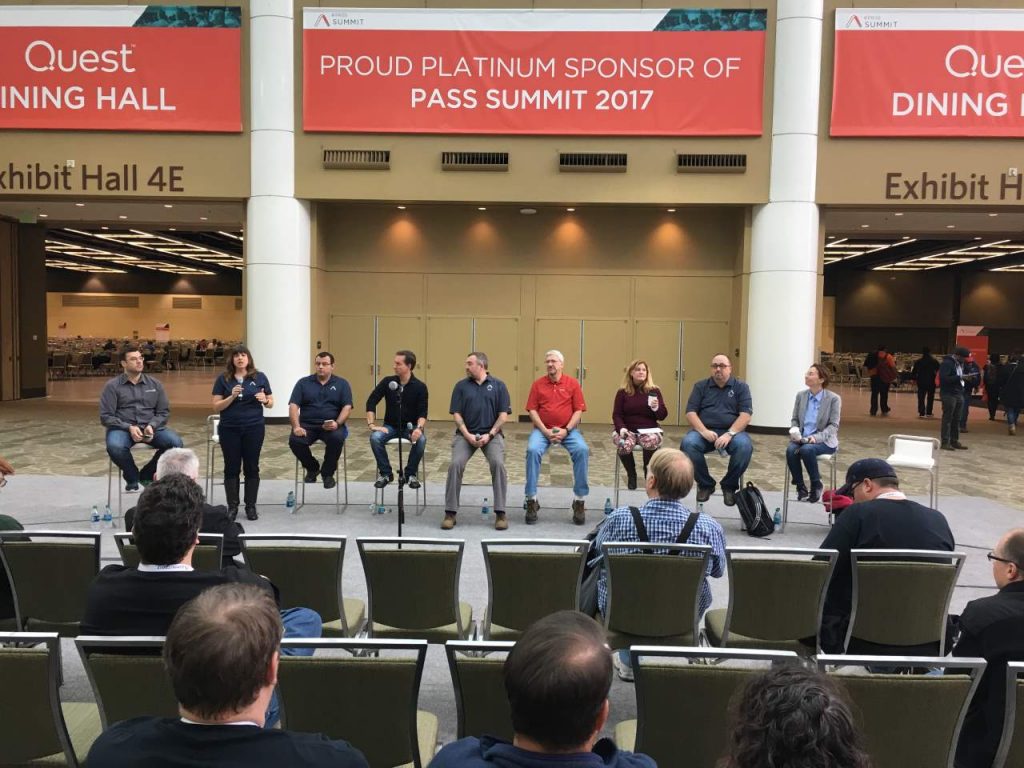 KN: How can you split your time between PASS and Redgate?
KN: How can you split your time between PASS and Redgate?
GF: I’m very fortunate with my job. Redgate Software is a great, great organization. They are active supporters of the community. They support the SQL Saturday events and other events all over the world. They believe in the concept of the community so they supported me running for the Board. I’m given the dispensation to spend a little bit of my work here, occasionally, on the community stuff. I’m just very thankful for that. I’m lucky.
KN: Going forward to the Redgate now. What are your main duties there?
GF: Oh, I stand around at parties… [laugh]. My main thing at Redgate is to learn how this software works. I have to learn as much as I can about the tools and then I have to learn how to apply them in the businesses. Then I basically come back around and teach you guys how to do the same thing. That’s the big part of what we do – I get an understanding and then I share that understanding, either through webinars, videos or articles. I also occasionally do consulting on the side so I travel to some places, talk to the DBAs and work with them to fix their DevOps solution.
KN: From that perspective it is very good to have a direct connection to the people.
GF: Yes, you want to make sure that you’re attempting not only to solve the problem that they need but also that you understand what problems they have so that you are building the tools that they need. I do that. And then I work with our dev teams because, as a DBA by experience, I bring a perspective that they don’t have and I can work with them to help set the agenda on the projects.
KN: How is your work-life balance?
GF: What is life-thing you talk about? [laugh] It’s pretty good. It really is. I’m really lucky because in Redgate they take pretty good care of their employees. Every 5 years they give you 6-weeks sabbatical. And so I just recently took mine for the first time, even though I’ve been there for 6 years – I delayed it for a year. So I had basically 6 weeks to spend at home with my wife. For three weeks we went to Germany, because I’m trying to learn how to speak German.
KN: Oh really? We saw your pictures from there on Facebook.
GF: We had a really good time. She got to see me for 6 weeks so the fact that I am away from home…
KN: That’s for the balance.
GF: That’s it – 6 weeks every 5 years! No, I’m kidding. They take really good care of us. My travel time is about 50% so I’m about half the time on the road. But the other half I work from home so I’m able to set my own schedule and get things done when I need to: go camping with the kids, go work out – I need to do a bit more of that, obviously. Step away from the dinner table. I get to do a lot of that kind of stuff. It works out fairly well since it’s only half the time on the road.
KN: Tell us and our listeners how you start your adventure with SQL Server.
GF: I’ve been working with it for 25 years or so. I started out initially as a developer and I was doing a lot of VB back then and I moved onto C# and some Java. Initially SQL Server was just this thing that I used to work on the back-end but what I found out was that I spent more time messing with the database, making sure we had right indexes, changing the database design. I spent more and more time on the database. So at one point in one of my jobs we didn’t have a DBA – I found that later why. And I went to my boss’s office one day and said: “Look. This is going wrong.” And I kind of went off on a crazy rant – yelled and screamed. “This is the problem, this is the problem and this is the problem.” And he started writing all the problems down on the board. I kind of calmed down because I saw that he was listening to me. And he turned and said: “Ok, so which one of these you think you are to address first?” And I thought to myself: “What?” And suddenly I was a DBA. It was kind of shocking! That was how I started as a full-time DBA. It was about 20 years ago.
KN: Yes, a long time ago. Damian, do you have any more questions in that area?
DW: I will ask only one – what is your favorite tool? What do you use the most?
GF: Redgate SQL Prompt – of course! But apart from Redgate – what is my favorite tool? Let me think about it for a second. Funny enough, it’s not a database tool. The one tool that gets me through my day – because I have to record videos and all these other stuff – I really appreciate Techsmith Camtasia and Snagit. They are the two tools that I use all the time because they let me do the screen captures in a really highly-controlled fashion and also they allow me to record videos. I use those a lot! But SQL Server tools – I can’t pick a competitor so I have to think about this. I know! Cios! Cios has got some really interesting stuff going on. I’ve been seeing what they are doing with it and it’s pretty amazing. They’ve put machine learning into some of the monitoring products that they are doing on Azure. It’s really amazing.
DW: I would like to ask you about what do you do for community or how do you share knowledge? I know your blog and I would like to ask you why do you call yourself “Scary DBA”? What’s so scary about you?
GF: I don’t think I’m scary at all. The story is really simple. My previous employer… when I first started we only had a few DBAs there and frankly some of the DBAs that we had at that time, they translated over from the Oracle side. They weren’t always that great. A bunch of them learned stuff and we became a great DBA team but when we started it was little rocky. One day the developer came over to me and said: “I’ve got a problem. Can you help me?” And I sat down and walked him through the problem. He went back to his dev team and said: “Hey, I’ve got the solution to the problem. I’ve talked to a DBA.” And they were like: “Wait a minute! Which DBA did you talk to?” because there was this concern that some of the DBAs weren’t quite getting things right. And he said: “Oh, you know, I’ve talked to the scary one.” Then everybody in the room went: “Oh! Grant!” and then they started laughing and called me up and said: “You never guess what happened!” And they told me the story. The next week a name plate shows up on my desk – Scary DBA. So everyone would know who I was.
DW: So now we know the story!
KN: There are many volunteers working during the PASS Summit conference and the SQL Saturday. How could you encourage the people to be volunteers?
GF: First, I would start off by going to your local groups wherever they are – I know you have a bunch at home. That is a good place to start and frankly, I would volunteer to speak. Because local groups are pretty much always looking for speakers. It’s a constant thing. So – volunteer to speak. Everybody can teach something, everybody knows something that the rest of us don’t or you have a better slam on something that the rest of us have. I would start there. Maybe help out with the local group – help organize the pizza one night, see if your company can sponsor or host the meeting. The more you do it, the more you’re going to recognize that it’s all about meeting people in networking. A lot of people are saying that networking is about looking for work. It’s not! Networking is about making contacts with people. If you make contacts with people, can it help you get your job? Sure, it can. But more importantly, it helps you to build up a knowledge base. You know, I don’t know everything. I can’t know everything. So I have some friends I know who are really good at SSIS, and I also knew some people who are doing analysis – services or power BI. If I have a problem, I can send off a quick question: “Hey, when you have 5 minutes, can you help me out with this?” It makes me a better employee because I’ve got a broader scope of knowledge available to me rather than just the stuff that’s inside my head or what I can google. I’m going to get better answers from friends and acquaintances who are experts at different things. The networking is a huge aspect. It’s just invaluable to your career to have a good network of individuals – fellow DBAs and developers, analysts – you won like a diverse board of people, you’ve built your own little board of directors that you can talk to and get help from. If some of them will be the consultants, they’ll say: “I’ll give you 3 minutes!” And then you’d have to pay for it! But you still get that 3 minutes. So it’s just the great way to go.
KN: Yeah, but still so many consultants have an MVP title?
GF: Sure, there are a bunch of them.
KN: So I think that they should be obligated to answer your questions, at least!
GF: Well, a friend of mine, Jeff Hiten, put it: “The MVP has a helping gene.” We can’t help it. If you come and ask us for help, we’ll help you. It’s just how it goes. I think it’s just a big part of how you make an MVP – you’ve got that gene built in your DNA.
DW: “Helping gene” and of course the wish to share the knowledge because you can also learn by sharing the knowledge.
GF: Oh, yeah. I learn more by doing the presentation because I have to structure everything, set up the examples. I have to test it and validate it. And then, when I am presenting it, I get asked questions. I don’t always know the answers to those questions so it becomes something else that I have to go in and look up. This is this nonstop knowledge. It’s wonderful.
KN: It was proved by the scientists that you can learn the most if you are preparing yourself to the presentation and sharing the knowledge.
GF: So scientists say it’s ok – awesome!
DW: How do you prepare yourself to give the presentation or the talk?
GF: The hard part is deciding what to talk about. Figuring out how to say something new about the topic or how to have a new wrinkle on a topic. You could just teach the same stuff over and over again, obviously, but you always want to add and change something. So coming with the topic is the hard part. But once I’ve got a topic, I start to drilling down on the data – I read articles on it, I write articles on it while I’m doing stuff. I will spend a lot of time with the database and just drill down on whatever it might be and figuring out the ways to break it or modify it or make the behavior change. Frankly, I call it playing. I go and play. Let’s say you want to look at batch mode processing in an execution plan, so how do you do that? You go in and set it up, right? Create a table or create a database. Add some data in there or slap a columnstore index on it. Run a query: “Did anything happen? Ok, what if I run a query differently, what happened? What if I change the data, what happen? If I force the plan to go parallel, what happened?” And just work your way through that and then once you’ve got the knowledge, then you just start to say: “Well, hang on! How did I have to set this up: 1, 2, 3, 4? What do I have to do to modify it: a, b, c, d?” Awesome! There is the presentation: 1, 2, 3, 4 – a, b, c, d. We’re done. Just be able to walk through and explain it to people. I do rehearsals. I will walk around my room, running through my slides and demos and talking to myself. My wife makes fun of me. I do practice everything. Because you don’t want to do anything for the first time standing in front of a hundred people. That’s no fun. Although I’ve done that and that’s how I know it’s no fun. That’s pretty much it. It’s really coming up with the idea and then play with the topic until you’ve got enough knowledge to put together your presentation.
KN: On Twitter, as I correctly remember, you have more than 10,000 followers?
GF: Yes, I just broke 10,000. It was like two month ago.
KN: Do you feel like the public person?
GF: No, I don’t. I try to put myself out there and be accessible to people. My goal is to be helpful. I’m not that smart but I’ve been around a long time. I know a few things and I feel like I can share those things. Frankly, I got a good feeling out of sharing. It’s kind of selfish really. It’s not so much that I’m some wonderful, nice guy. If somebody says: “Man, your script helped me!” That’s why I do it. “I read your blog and it gave me a piece of knowledge that fix something at my company!” That’s how I win. Those little moments where somebody says: “That helped.” It’s like: “Ta-da! I win.”
KN: That’s your prize from your work.
GF: Seriously, that’s my prize. And just come to find out that some companies will pay for you to do that.

Check audio version to work out why this picture is right here…
KN: True. I’ve asked about your Twitter and your followers as well, because I’ve seen many times that you share some articles that you’re reading. And it’s not about the IT. It’s a completely different area.
GF: I do read a lot of stuff on IT but I also read a lot of stuff on how people think, how to better communicate or how to put together presentations. I read a lot of science articles on space because I’m just interested in that. I read tons of articles on history. I’m a big history nerd. And if I found a good one, I mark it. Then I share it later. During a week I just spit out two or three links to articles that I found interesting. Lots of them are about SQL Server but sometimes it’s how to write a better presentation.
KN: Sometimes it’s good to read something else.
GF: Yes, and it gives your brain a rest.
KN: Yes, exactly.
DW: I think, Grant, that your journey to Germany was pure historical because you’ve been in so many historical places.
GF: Oh, yes. We hit a museum almost every day – my wife and I. I’m a hardcore history freak – walking around looking at the architecture, visiting certain locations. There were many great places. I don’t want to pick up just one place and say it is the best place. But the best specific location that I most enjoyed was going to the Battle of Nations in Leipzig. There is a big monument there which was just stunning. That was a special moment. But that’s a Napoleonic War thing for anybody who doesn’t know.
DW: I have one question about the community. As you were explaining how you prepare to give at least a good presentation – however I think that you give perfect presentations – but how would you like to convince a typical person to prepare to be a speaker during a local meeting?
GF: It’s easy. Let’s say you’re a DBA. And let’s say that you’ve got a development team who try to do something that’s gonna hurt your database, like they want you to put in all heap tables or something crazy like that. How do you convince them to not do this crazy thing? Well, you have to explain to them what’s going to happen when they do this and how it’s going to hurt performance, the various effects that it could have. That is basically the presentation. You are absolutely going to be teaching someone and putting across your point of view. If you do that really poorly, then they’re going to drop all the indexes on the database and everything is going to be a heap table and you’ll be living with that for a long time. So since we want to avoid this heap table problem, let’s learn how to give an effective presentation and learn how to talk through these points and attack them from a logical standpoint in such a way that I can convince someone that I’m right and that I’m going to be helpful to them. It’s not simply: “You’re wrong” but it’s rather saying: “Here’s what happens and here’s what we could do to make things better.” Just talking to strangers and walking through this process is a great way to train and practice. Then you come back to your business and you do it there. It’s the same when you want to convince your boss to give you a rise – that’s a presentation, right? If you are in a job interview – that’s also a presentation. You’re actually doing presentations a lot. You just don’t think about them that way. So it’s actually worth it to practice presentations. And a good way to do that is by going to your local group and doing the presentations. You don’t have to be trying to be MVP. But just for your own personal business and your own personal life, practicing your presentations is a great way to go. I would also say the same thing about blogging. It’s practice writing, and you have to write emails, business proposals, evaluations. So practice writing by writing a blog. Further, we want learning things and you’re learning them one step at a time and if you write them down in a blog, it makes it a lot easier to remember them later. Also – keeping a blog or something like that acts as a way for employment for you so that you can show businesses what you’ve learnt and what you’ve been doing. Any of these things that we are doing is not simply becoming an MVP or going on the road and speaking in 27 different countries. It’s just about being better in your own job.
KN: Are you a perfectionist in your personal or professional life?
GF: Am I a perfectionist? Good God, no! No, no, I’m not. I’m really not. I’m largely very compromised individual. I just do my best to get by. I couldn’t do a perfect thing no matter how long I tried.
KN: But probably by most or at least by the all people from the community or the attendees of such conferences you are seen as a very good professional.
GF: My approach is not to be a perfectionist. My approach is to try to do as much of the right things as possible and deal with the fact that you’re not always going to get it perfect. Would I want my database just to be purely designed and tuned to a fair-thee-well, and everything’s just shiny? Yeah! I’d love to get there, but I’m not going to. I’ve accepted that. I’m just going to go for “good enough”. I’m going to go for “this meets the business needs adequately”. It doesn’t have to be perfect. It just needs to be good enough. Like an execution plan – good enough!
KN: But not perfect. There is nothing like a perfect thing. It’s good to hear that because we’ve already heard that from many people that the perfectionism is not the goal itself.
GF: Yes. Honestly, a lot of people will look around and say: “I’m not going to do this because I can’t be as good as you”. It doesn’t matter. One, you probably will be better than me. But you want to be good enough. You don’t need to be perfect or great, just be good enough. People shouldn’t stop trying. They should keep going.
KN: You can be a perfectionist in your own way, yes?
GF: Yeah, of course.
DW: This drives me to one more question about your blog where you put lots of articles with great quality. In my opinion at least most of them are really helpful. Imagine that there is a new person who would like to start blogging and this person says: “Well, there is Grant, there is Aaron Bertrand, Brent Ozar, Paul Randal and many other great authors, what can I write? I have maybe 1% of their knowledge. Should I start? How should I start?”
GF: Oh, that’s an easy one. I can tell already the same thing. Ok, I Shouldn’t say that. If you’re a developer, I’m not sure what I’ll tell you. But if you’re a DBA, I would tell you exactly what I’ll tell you. Write a blog on backups.
KN: Only about that subject?
GF: The reason I say backups is because one of the problems that we run into is that people aren’t taking their backups. It was recently reported that the New York Police Department has a database that they haven’t backed up ever. It’s a database of money, of confiscated materials. And they don’t back it up. You look around and you’re like: “Really? I thought we solved that problem.”
DW: Yes, like 20 years ago!
GF: Yeah, I kind of really thought that we had this one cornered. Everybody knows to run their backups. But evidently not!
KN: Nobody remembers who did it.
GF: So the thing is like: “Please go out there and write an article on backups.” Because somebody who’s not doing their backups is going to read your article. They’re gonna find your article. And your article is going to speak to them personally in a way that they’re going out there and get their backups done. That is the same way on every single topic. It doesn’t matter that somebody else has done it. Your point of view is going to be different. And your point of view may speak to other people better than my point of view. There’s no reason why you can’t do the exact same article that I just did. In fact, go and steal my last technical article and write your own version. Why not? It’s not gonna be a bad thing to have two people talking about the same topic.
KN: Basically, in a different way.
DW: This is crucial what you have said: “Write it in your own way.” It’s not purely stealing.
GF: Yeah, I don’t want you to literally steal it. That would be bad. If so, I’ll come down and find you.
DW: That’s right. It always has to be something personal in this article – the author’s point of view.
DW: What do you feel is your greatest achievement? In your professional or personal life?
GF: I was gonna say I raised two kids and they’re in college. I think that is my number one achievement. I managed not to break them.
KN: That’s true.
GF: I think that’s number one. Other than that – professionally, I think it was when I made an MVP. That was a moment that I will remember forever. It was just amazing. Most recently, I would say – being honored enough to become PASS President. I’m still coming to terms with that one. I might think differently later. But really the one that I made an MVP. I was just so chuffed, amazed and out of my depth. I can’t imagine another feeling like that. It was cool.
DW: How long are you an MVP?
GF: I’m coming up on 10 years.
DW: So it’s like me – I started being an MVP in January 2009.
GF: So you are ahead of me. Mine was in April. 1st April – April Fool’s Day. I had to check the email header to be sure that it was really from Microsoft. I thought somebody might have been fooling with me.
DW: Do you have any animals at home?
GF: Yes, actually I do. We have a little German Shepard puppy. She’s about 9 months old. Her name is Anika. Right now she’s maybe 40 pounds, so she’s very small. She’s probably going to be about 70 pounds or so. She’ll be a good sized dog.
KN: That’s why I thought it was small because I probably saw it in the picture.
GF: Yeah, we had another dog – Maximus – and he died. He was a big boy. He was 80 pounds. He was a big buff bear of a dog.
KN: Thank you very much Grant. At the end of our conversation I would like to ask you where can we find you, where can the listeners can find you?
GF: Online – @GFritchey is my Twitter handle and my blog is www.scarydba.com. You can find me there. And live – the only thing that I have coming up is that I will be at Live360 in two weeks in Orlando, Florida. But more importantly in February, I will be on SQL Cruise in Caribbean, which is www.techoutbound.com if you’re gonna to check that out. It’s run by Tim Ford. It’s a pretty amazing event. It’s special. You get more dedicated time with speakers there than you will anywhere every. Kevin Kline is going to be there. It’s going to be a great event.
KN: Yeah, it’s a special place as well.
GF: Yeah, and also you’re get to hang out on the beach with rum. So that’s cool.
KN: Yeah, very cool.
DW: And hopefully we will be able to host you again in Wrocław during SQLDay one more time.
GF: I would come back to Wroclaw in a second. That was a great event. You guys are doing a great job. Believe me! I’ve sent people to you, like: “Go and ask him if you can speak!”
KN: Thank you for that.
GF: I’ve talked up Poland like you wouldn’t believe. I loved it there.
KN: Damian, now you know why we have so many speakers from the USA.
DW: That’s great. We’d like to be even bigger because we have a potential to be bigger but it’s community speakers so everybody makes this conference. When you was there last year with us, it was a big kick off for us. We were able to ask Brent and Greg Low to come. They were this year in May. We’ll see who will be with us next year. For example, we have Itzik Ben-Gan who is willing to come and give us all-day workshop.
KN: But you are always welcome as well.
GF: Thank you. I would love to come. I’ll have to arrange it with work but I’ll come there in just a second. It’s one of my favorite places now. I didn’t know it was my favorite place till I went there. But now it is one of my favorite places. You and Belgium – I just can’t get enough.
DW: I’ll send you an email because people were really asking for you. We can have you at least one more time because your sessions were great.
GF: I would go every year if Redgate lets me. But I know that you will get sick of me at one point.
DW: It’s knowledge, so people like it.
KN: Thank you very much.
GF: No problem. It was great talking to you. Thank you very much. Thanks for the time. And keep doing what you’re doing.
Useful links:
Grant’s Twitter: @GFritchey
Grant’s blog: www.scarydba.com
Grant’s books on Amazon
Redgate: Twitter | Website
PASS Organisation
About author
You might also like
ASF 020: Paweł Potasiński interview
Introduction CTO at Clouds On Mars, former Microsoft employee as Data Insights Product Manager for Poland. In 2007 Pawel started Polish SQL Server User Group (PLSSUG), currently known as Data
ASF 012: Rob Sewell interview
Introduction Rob is a SQL Server DBA with a passion for Powershell, Azure, Automation & SQL. He is an MVP & an officer for the PASS PowerShell VG & has
ASF 030: Benni De Jagere interview
Introduction Benni De Jagere is a Senior Data Insights Consultant with a strong focus on the Microsoft (BI) Stack. On a daily basis, he turns (large amounts) of coffee into

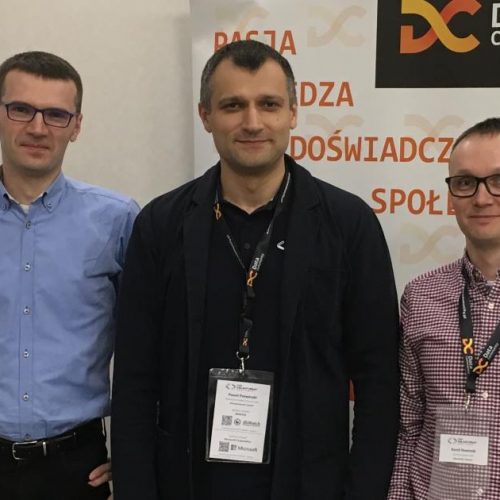
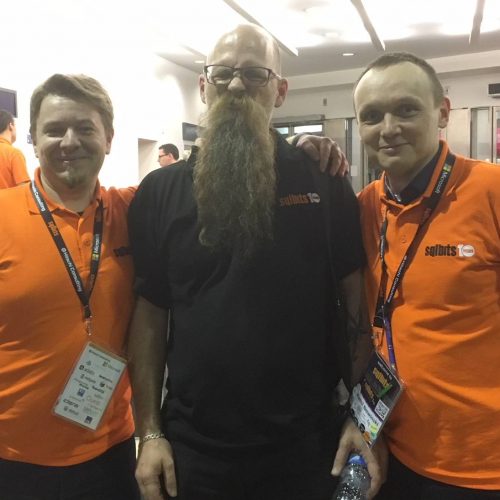
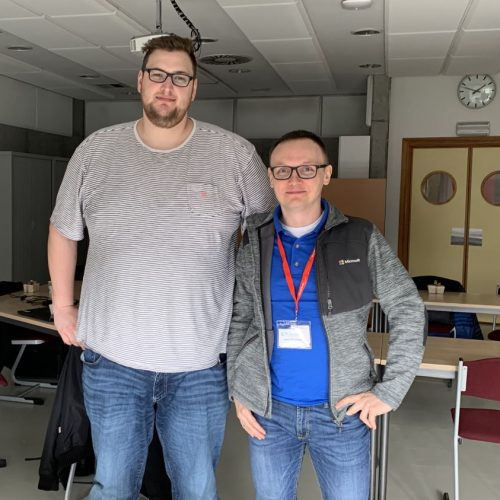


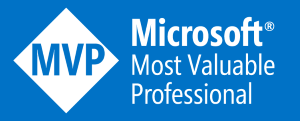

0 Comments
No Comments Yet!
You can be first to comment this post!